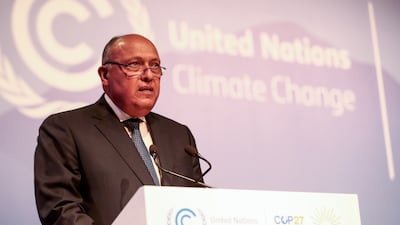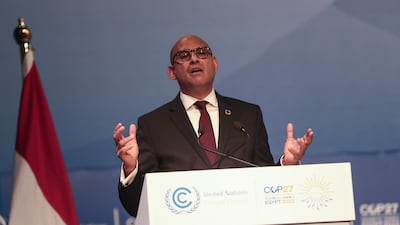The climate summit in Egypt, Cop27, will be the focus of much of the world's attention in the coming fortnight. Global leaders and delegates will gather at the resort town of Sharm El Sheikh to address an extensive agenda that is urgent and complex, affecting countries and people in all four hemispheres.
Just last week UN Secretary General Antonio Guterres once again urged wealthy and poor nations “to close the ambition gap, the credibility gap and the solidarity gap” when they convened at the event in Egypt.
Given the rising global temperatures and the clear warnings from scientists, there can be no disagreement with Mr Gueterres's point. In today's world, however, the challenges facing even rich countries are daunting. Balancing already stretched budgets – due to the pandemic's toll on global health systems, and the war in Ukraine causing an energy crisis in Europe – not all countries will find climate goals easy to accomplish. Sticking to net-zero commitments in fraught geopolitical scenarios is that much tougher, despite the urgency of the challenge, very much at the centre of discussions this coming week.
President Sheikh Mohamed will lead a large delegation from both the public and private sectors in the UAE. It will be an opportunity for countries in the region and wider world to recognise the UAE's progress on a number of previous climate commitments. Several accomplishments have added to earlier successes on the Emirates' goals, whether with regard to the UAE's 2050 Energy Strategy, or balancing investments in the energy systems of today and of the future or last week's US-UAE partnership of $100 billion on clean energy.
Building on last year's summit in Glasgow, Cop27 – an acronym for the 27th Conference of the Parties of the United Nations Framework Convention on Climate Change – is also being referred to as Cop for Africa or African Cop, which draws attention to a troubling issue: the extreme climate the continent is facing. This reality is viewed as unfair by many environment stakeholders, as Africa emits a tiny fraction of the quantity of carbon that countries in the developed West do, often at the cost of that development.
As part of a larger solution, earlier this year, the UAE launched Etihad 7, a programme to secure funding for renewable energy projects in Africa, with the goal of supplying clean electricity to 100 million people by 2035. This is just one among several necessary steps that will have to be formulated by regional stakeholders in the near future.
Over the next 12 days at the summit, heads of countries will discuss decarbonisation, water security, food security, energy mix, biodiversity, youth and future generations, finance and related themes. These affect rising global temperatures, leaving no countries immune. The enormously damaging consequences can range from wild fires to land slides or torrential floods. Even apart from the enormous destruction, affecting lives and livelihoods, such climate-related catastrophes push nations back many years in their development trajectories. Even since the climate summit in Scotland last year, multiple hazardous weather events related to climate change have occurred in disparate parts of the world.
Solutions are ever sought to try and curb and control factors that add to climate change. And the UAE is committed to its goals. Dr Sultan Al Jaber, Minister of Industry and Advanced Technology, Special Envoy for Climate Change and chairman of Masdar, told The National: "Today, the UAE is one of the world’s largest investors in global renewable energy projects and has invested $50 billion in renewable energy projects in over 70 countries, including 31 island developing states that are most vulnerable to climate change."
When the baton is passed from Egypt to the UAE to host next year's Cop28, the UAE will have added to its roster of climate commitments, boosting sectors such as hydrogen, solar, renewables and an innovative energy ecosystem. When the rest of the region also sticks to targets and countries globally are on the same page to limit climate change, science says that the world will still stand a chance.




























